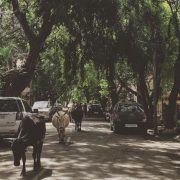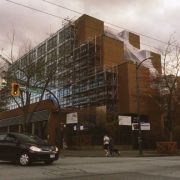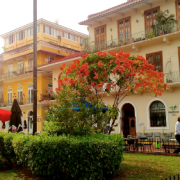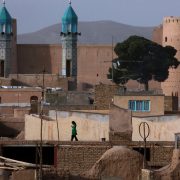Make it Work
Post by Phoebe Brauer, MURP student, who worked in Myanmar
It’s the end of the rainy season in Yangon, so in the afternoons I usually get stuck somewhere and the internet goes out. Even as I write this, I am at a fancy Japanese coffeehouse for business meetings and the wifi connection is not working. Still, Yangon is developing rapidly. From last year to this year, there are new colorful children’s playgrounds in the parks and consistent electricity, as well as more advertisements, more construction, more taxis, and more shopping malls.
As the government continues to decentralize and restructure, daily life persists despite a crumbling and insufficient infrastructure. There continue to be many gaps in city services in Yangon, despite foreign investments pouring into the country. Leadership is hesitant to move forward large infrastructure projects with high costs, and residents have adapted to failing city systems. In lieu of long-term investment, residents endure by inventing solutions for their daily needs. Whether plugging a leaky roof or using makeshift pulley-systems for walk-up apartments, residents do what they can to “make it work.”

This is what it looks like when a streetlight is getting fixed in an area under rapid construction called “New Yangon.”
Physically being in Myanmar and the region has opened doors for me that would have been impossible to access from home. My main project here has been linking various stakeholders, such as international agencies, the government and regional institutions, and facilitating a collaborative project on sustainable development. The project explores the socio-cultural aspects of sustainable sanitation services and decentralized wastewater management. Less than half the population in Myanmar is connected to a municipal water system and in Yangon only 10% of water is treated. So I’ve been spending a lot of time thinking about and looking at sewage. Little did I know sewers are a key location in discovering subtle micro-solutions!

Planks of wood or slabs of concrete come in handy when there are gaping holes with open sewage run through the sidewalks, especially for street vendors.
Micro-solutions are ubiquitous in a city like Yangon, where you confront hazards almost with every step. Poor lighting, crumbling concrete, and open sewage ditches present pedestrians with a challenging obstacle course. Strained resources and neglected infrastructure demand that Yangon now figure out how to cope with rapid urbanization. During the rainy season, when flooding is a regular occurrence, trash stockpiles in sewers around the city. While most remain unattended to, I did catch the rare sight of one gutter getting cleaned by a man. Of course, he wore no protective gear as he trudged through thick, contaminated sewage flow.
One day after a meeting with a member of the Ministry of Health, I had my own “make it work” moment. Lugging my laptop through a slum community behind one of the new mall chains, the straps on my bag snapped. After several inquiries in broken Burmese trying to locate a sewing machine, a young girl escorted me to a small shop where a woman and her mother were eating lunch. Despite being interrupted, the woman immediately took my bag into the back and stitched it up, refusing any form of payment. While I waited for the bag, however, I witnessed members of the Yangon City Development Committee come by the shop to collect what was explained to me as a “cleaning tax.” I was surprised to hear this as I was sitting on a cement step over trash floating in the open sewer. Unfortunately, these tax dollars will most likely go towards cleaning the tourist areas and business district, so the benefits remain invisible in this neighborhood and many others like it.
Sometimes making it work exhibits the innovative, creative, and often generous ways people adapt to their situations. However, it can also be a symptom of much larger problems like neglect, exploitation, and oppression. Hopefully Myanmar can “make it work” for the benefit of all its citizens as it enters the 21st century.












Leave a Reply
Want to join the discussion?Feel free to contribute!